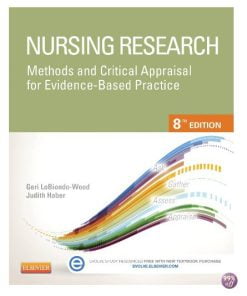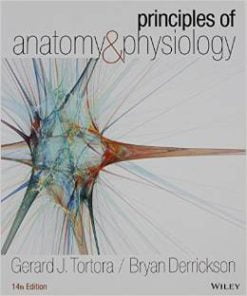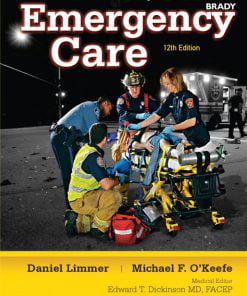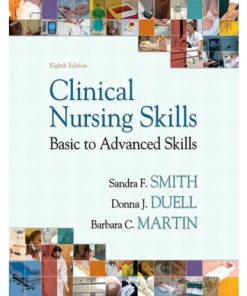Test Bank for World Regions in Global Context: Peoples, Places, and Environments 6th Edition
$35.00 Original price was: $35.00.$26.50Current price is: $26.50.
Test Bank for World Regions in Global Context: Peoples, Places, and Environments 6th Edition
This is completed downloadable of Test Bank for World Regions in Global Context: Peoples, Places, and Environments 6th Edition
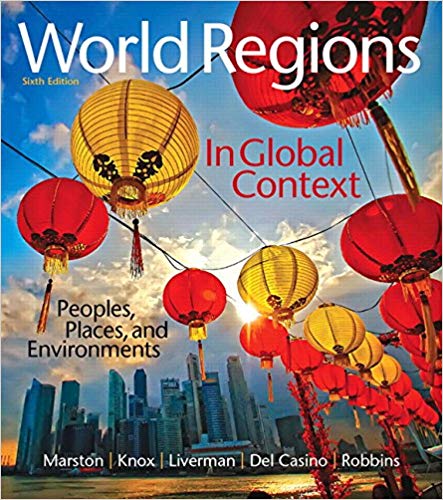
Product Details:
- ISBN-10 : 0134183649
- ISBN-13 : 978-0134183640
- Author: Sallie Marston, Paul Knox, Diana Liverman, Vincent J. Del Casino Jr., Paul Robbins
World Regions in Global Context presents a strong global sensibility and an emphasis on current events, with examples of interdependent development, spatial and social inequality, and questions of spatial justice. The authors maintain that regions are the outcomes of the twin forces of globalization and regionalization. Therefore, each regional chapter stresses the global systems of connection that drive unique regional processes, making regions different. By studying regions, students not only learn the critical elements of different places, but also come to understand the fundamental processes that drive change.
The 6th Edition is a briefer, more visual text that still maintains its conceptual rigor by addressing today’s critical geographic themes, incorporating deeper focus on sustainability issues, new human stories from the regions, cutting-edge data visualizations and infographics, including a completely modernized cartography program, and much more.
Table of contents
- A Conceptual Exploration of World Regions & the Issues Critical to Geography Today
- The Important Issues & People Shaping World Regions
- Current & Compelling Stories from the Regions
- A Changing World Geography
- Dynamic Data Visualization & Critical Analysis
- Continuous Learning with MasteringGeography Before, During, and After Class
- MasteringGeographyTM
- www.MasteringGeography.com
- World Regions In Global Context
- Brief Contents
- Contents
- Preface
- New to the 6th Edition
- Objectives and Approach
- Thematic Structure
- Pedagogy and Content Enrichment
- Conclusion
- About the Authors
- Digital & Print Resources
- 1 World Regions in Global Context
- Learning Outcomes
- Thinking Like a Geographer
- Place and the Making of Regions
- Maps and Mapping
- Globalization and Regionalization
- Apply Your Knowledge
- A World of Regions
- Organizing and Exploring the World’s Regions
- Environment, Society, and Sustainability
- Climate and Climate Change
- Regional Climate
- Climate Change and a Warming World
- Apply Your Knowledge
- Geological Resources, Risks, and Water
- Resources and Risks
- River Formation and Water Management
- Apply Your Knowledge
- Ecology, Land, and Environmental Management
- Ecosystems and Biodiversity Decline
- Human-Influenced Ecologies
- Apply Your Knowledge
- Sustainability and the Future
- Apply Your Knowledge
- History, Economy, and Territory
- Historical Legacies and Landscapes
- European Colonialism, Capitalism, and the Industrial Revolution
- The Process of Decolonization
- Communism and the Cold War
- Future World Regional Systems
- Apply Your Knowledge
- Economy, Accumulation, and the Production of Inequality
- Economic Sectors and Regional Economies
- Measuring Economic Development
- Patterns of Social Well-Being
- Explaining and Practicing “Development”
- Apply Your Knowledge
- Territory and Politics
- States and Nations
- Political Globalization
- Apply Your Knowledge
- Culture and Populations
- Culture, Religion, and Language
- Geographies of Religion
- Geographies of Language
- Apply Your Knowledge
- Cultural Practices, Social Differences, and Identity
- Culture and Identity
- Apply Your Knowledge
- Demography and Urbanization
- Modeling Demographic Change
- The demographic transition
- Apply Your Knowledge
- Future Geographies
- Population Boom or Bust?
- Emerging Resource Regions
- Economic Globalization and Challenges to Regional Governance
- New Regions of Insecurity and Crime
- Future Environmental Threats and Global Sustainability
- Learning Outcomes Revisited
- Key Terms
- Thinking Geographically
- Data Analysis
- 2 Europe
- Learning Outcomes
- Environment, Society, and Sustainability
- Climate and Climate Change
- Europe and Climate Change
- Apply Your Knowledge
- Geological Resources, Risk, and Water
- Northwestern Uplands
- Alpine Europe
- Central Plateaus
- North European Lowlands
- Apply Your Knowledge
- Ecology, Land, and Environmental Management
- Roman Land Improvement
- Medieval Settlement
- Emergence of the Modern Landscape
- Apply Your Knowledge
- History, Economy, and Territory
- Historical Legacies and Landscapes
- Trade and the Age of Discovery
- Colonialism
- Apply Your Knowledge
- Industrialization
- Imperialism and War
- Eastern Europe’s Interlude of State Socialism
- The Reintegration of Eastern Europe
- Apply Your Knowledge
- Economy, Accumulation, and the Production of Inequality
- The European Union: Coping with Uneven Development
- Apply Your Knowledge
- Regional Development: Europe’s Core Regions
- High-Speed Rail
- Apply Your Knowledge
- Territory and Politics
- Regionalism and Boundary Disputes
- Ethnic Conflict in the Balkans
- Apply Your Knowledge
- Culture and Populations
- Culture, Religion, and Language
- Language Families
- Religious Diversity
- Islam in Europe
- Regional Cultures
- Apply Your Knowledge
- Cultural Practices, Social Differences, and Identity
- The Concept of Modernity
- Social Critique and the European Dream
- A “European” Identity?
- Demography and Urbanization
- Demographic Change
- The European Diaspora
- Migration Within Europe
- Recent Migration Streams
- Europe’s Towns and Cities
- Apply Your Knowledge
- Future Geographies
- Coping with Aging Populations
- Coping with Immigration
- The EU: Costs of Expansion
- The EU: Problems of Indebtedness
- Learning Outcomes Revisited
- Key Terms
- Thinking Geographically
- Data Analysis
- 3 The Russian Federation, Central Asia, and the Transcaucasus
- Learning Outcomes
- Environment, Society, and Sustainability
- Climate and Climate Change
- Adapting to a Warming Continent and Melting Sea Ice
- Apply Your Knowledge
- Geological Resources, Risk, and Water
- Mountains and Plains
- Rivers and Seas
- Apply Your Knowledge
- Ecology, Land, and Environmental Management
- The Tundra
- The Taiga
- Mixed Forest
- The Steppe
- Semidesert and Desert
- Challenges to Sustainability in the Region
- History, Economy, and Territory
- Historical Legacies and Landscapes
- The Rise of the Russian Empire
- Revolution and the Rise of the Soviet Union
- Soviet Industrialization and Its Environmental Legacy
- Economic Growth and the Cold War
- Economic Stagnation and the Decline of the Soviet Union
- Apply Your Knowledge
- Economy, Accumulation, and the Production of Inequality
- Building a Market Economy
- Regional Development and Inequalities
- Territory and Politics
- Chechen Independence
- Ethnonationalism in the Transcaucasus and Central Asia
- Geopolitical Shifts and Ongoing Regional Tensions
- Russia on the World Stage
- Apply Your Knowledge
- Culture and Populations
- Religion and Language
- Religion
- Language
- Apply Your Knowledge
- Cultural Practices, Social Differences, and Identity
- High Culture
- Popular Culture
- Social Stratification and Conspicuous Consumption
- Gender and Inequality
- Demography and Urbanization
- Demographic Change
- Global and Regional Migration Streams
- Apply Your Knowledge
- Future Geographies
- Can Russia Conquer Its Energy Dependency?
- Democracy or Plutocracy?
- Will Russia’s Pacific Rim Be an Economic Boom?
- Demographic Challenge—Implosion and Decline?
- Learning Outcomes Revisited
- Key Terms
- Thinking Geographically
- Data Analysis
- 4 Middle East and North Africa
- Learning Outcomes
- Environment, Society, and Sustainability
- Climate and Climate Change
- Arid Lands and Mountain Landscapes
- Adaptation to Aridity
- Climate Change
- Apply Your Knowledge
- Geological Resources, Risk, and Water
- Mountain Environments and Tectonic Activity
- Water Resources and River Systems
- Water Resources and Sustainable Environments
- Apply Your Knowledge
- Nonrenewable Resources: Petroleum and Natural Gas
- Apply Your Knowledge
- Ecology, Land, and Environmental Management
- Flora and Fauna
- Environmental Challenges
- History, Economy, and Territory
- Historical Legacies and Landscapes
- Plant and Animal Domestication
- Birthplace of Three World Religions
- Urbanization
- The Ottoman Empire
- The Mandate System
- Apply Your Knowledge
- Economy, Accumulation, and the Production of Inequality
- Independence and Economic Challenges
- The Oil States
- The Eastern Mediterranean Crescent
- The Maghreb
- Social Inequalities across the Region
- Apply Your Knowledge
- Territory and Politics
- Intra-Regional Conflict and Tension
- The Israeli–Palestinian and Israeli–Lebanese Conflicts
- Israel and Lebanon
- Apply Your Knowledge
- The U.S. War in Iraq
- The Rise of the Islamic State of Iraq and Syria (ISIS)
- Nuclear Tensions
- Regional Alliances
- Apply Your Knowledge
- Culture and Populations
- Religion and Language
- Islam
- Christianity, Judaism, and Other Middle Eastern and North African Religions
- Regional Languages
- Apply Your Knowledge
- Cultural Practices, Social Differences, and Identity
- Cultural Practices
- Kinship, Family, and Social Order
- Gender
- Sexuality
- Apply Your Knowledge
- Demography and Urbanization
- Demographic Change
- Pull Factors
- Push Factors
- Cities and Human Settlement
- Apply Your Knowledge
- Future Geographies
- Oil
- Water
- Peace and Stability
- Learning Outcomes Revisited
- Key Terms
- Thinking Geographically
- Data Analysis
- 5 Sub-Saharan Africa
- Learning Outcomes
- Environment, Society, and Sustainability
- Climate and Climate Change
- Adaptation to Climate
- Climate Change
- Apply Your Knowledge
- Geological Resources, Risk, and Water
- Plate Tectonics
- Water Resources and Dams
- Soils, Minerals, and Mining
- Ecology, Land, and Environmental Management
- Major Ecosystems
- Diseases and Pests
- Apply Your Knowledge
- Land Use and Agriculture
- Conservation and Africa’s Wildlife
- Sustainability
- Apply Your Knowledge
- History, Economy, and Territory
- Historical Legacies and Landscapes
- Human Origins and Early African History
- The Colonial Era in Africa
- Slavery and the Slave Trade
- European Settlement in Southern Africa
- European Exploration and the Scramble for Africa
- The Legacy of Colonialism
- Independence
- Apply Your Knowledge
- Economy, Debt, and the Production of Inequality
- Dependency, Debt, and African Economies
- Contemporary African Agriculture
- Agricultural Challenges and Opportunities
- Manufacturing and Services
- China and the African Economy
- Social and Economic Inequality
- Regional Organizations
- Apply Your Knowledge
- Territory and Politics
- South Africa and Apartheid
- Apply Your Knowledge
- The Cold War and Africa
- Civil Wars and Internal Conflicts
- Peacekeeping
- Apply Your Knowledge
- Culture and Populations
- Ethnicity
- Religion
- Language
- Apply Your Knowledge
- Cultural Practices, Social Differences, and Identity
- Kinship
- Land
- Reciprocity
- Music, Art, and Film
- Apply Your Knowledge
- Sport
- The Changing Roles of Women
- Demography and Urbanization
- Demographic Change
- Factors Affecting Fertility
- Population Impacts of HIV/AIDS and Other Health-Care Concerns
- Apply Your Knowledge
- African Cities
- The Sub-Saharan African Diaspora
- Migration Within Africa
- Refugees and Internally Displaced Peoples (IDPs)
- Apply Your Knowledge
- Future Geographies
- Sustaining Representative and Effective Governments
- Economic Opportunities
- Food, Water, Health, and Energy for All
- Learning Outcomes Revisited
- Key Terms
- Thinking Geographically
- Data Analysis
- 6 The United States and Canada
- Learning Outcomes
- Environment, Society, and Sustainability
- Climate, Adaptation, and Global Change
- Climate Patterns
- Climate Change and Other Environmental Issues
- Apply Your Knowledge
- Geological Resources, Risk, and Water
- Physiographic Regions
- Geologic and Other Hazards
- Mineral, Energy, and Water Resources
- Apply Your Knowledge
- Ecology, Land, and Environmental Management
- Indigenous Land Use
- Colonial Land Use
- Contemporary Agriculture and Sustainability
- Environmental Challenges
- History, Economy, and Territory
- Historical Legacies and Landscapes
- Indigenous Histories
- Colonization and Independence
- The Legacy of Slavery in the United States
- European Settlement and Industrialization
- Apply Your Knowledge
- Economy, Accumulation, and the Production of Inequality
- The Two Economies
- Transforming Economies
- The New Economy
- Wealth and Inequality
- The United States and Canada and the Global Economic Crisis
- Territory and Politics
- States and Government
- A New Province
- Apply Your Knowledge
- U.S. Military Influence
- U.S. War on Terror: Afghanistan, Iraq, and Pakistan
- War in Iraq
- Al-Qaeda and Drone Warfare
- Costs of Iraq and Afghanistan Wars
- War on Terror Continues
- Apply Your Knowledge
- Social Movements
- Culture and Populations
- Religion and Language
- Apply Your Knowledge
- Cultural Practices, Social Differences, and Identity
- Arts, Music, and Sports
- U.S. Cultural Imperialism
- Canadian Cultural Nationalism
- Sex, Gender, and Sexuality
- Apply Your Knowledge
- Demography and Urbanization
- Immigration
- Immigration to Canada
- Assimilation and Anti-Immigrant Prejudice
- Internal Migration
- Settlement of Canada
- Demographic Change
- Apply Your Knowledge
- Urbanization, Industrialization, and New Growth
- Apply Your Knowledge
- Urban to Suburban Migration
- Future Geographies
- U.S. Dominance and Its Challenge
- Security, Terrorism, and War
- Environmental Change
- Learning Outcomes Revisited
- Key Terms
- Thinking Geographically
- Data Analysis
- 7 Latin America and the Caribbean
- Learning Outcomes
- Environment, Society, and Sustainability
- Climate and Climate Change
- Climatic Hazards
- Climate Change Impacts
- Climate Change Causes and Responses
- Apply Your Knowledge
- Geological Resources, Risk, and Water
- Earthquake and Volcanic Hazards
- Minerals, Mining, and Oil
- Water Resources
- Apply Your Knowledge
- Ecology, Land, and Environmental Management
- Plant and Animal Domestication
- Maya, Incan, and Aztec Adaptations to the Environment
- Apply Your Knowledge
- The Fate of the Forests and Biodiversity
- Sustainable Development
- The Green Revolution and Agriculture
- Biofuels
- Ecotourism and Conservation
- Apply Your Knowledge
- History, Economy, and Territory
- Historical Legacies and Landscapes
- The Colonial Experience in Latin America
- Demographic Collapse
- Columbian Exchange
- Land and Labor
- Export Commodities
- Apply Your Knowledge
- Independence
- Economy, Accumulation, and the Production of Inequality
- Export Dependence
- Import Substitution
- Debt Crisis
- Free Trade and NAFTA
- Apply Your Knowledge
- Contemporary Economic Conditions
- Economic Structure
- Inequality
- Apply Your Knowledge
- Territory and Politics
- U.S. Influence
- The Cold War and Revolution
- Authoritarianism
- Apply Your Knowledge
- Democracy
- Social Movements and Indigenous Rights
- Drug Economy
- Apply Your Knowledge
- Culture and Populations
- Religion
- Language
- Apply Your Knowledge
- Cultural Practices, Social Differences, and Identity
- Food
- Music, Art, Film, and Sports
- Gender Relations
- Demography and Urbanization
- Demographic Change
- Migration Within the Region
- Latin American and Caribbean Migration beyond the Region
- Apply Your Knowledge
- Urbanization
- Apply Your Knowledge
- Future Geographies
- Sustainable Development
- Emerging Economies
- Representation and Democracy
- Public Attitudes
- Learning Outcomes Revisited
- Key Terms
- Thinking Geographically
- Data Analysis
- 8 East Asia
- Learning Outcomes
- Environment, Society, and Sustainability
- Climate and Climate Change
- Adapting to Semiarid and Subtropical Climates
- Climate Change
- Apply Your Knowledge
- Geological Resources, Risk, and Water
- The Tibetan Plateau
- Plains, Hills, Shelves, and Islands
- Earthquakes in a Still-Forming Region
- Flooding, Flood Management, and Hydroengineering
- Apply Your Knowledge
- Ecology, Land, and Environmental Management
- Tibetan and Himalayan Highlands
- Steppe and Desert
- Inner China, Korea, and the Japanese Archipelago
- Revolutions in Agriculture
- Apply Your Knowledge
- Conservation Issues
- Wildlife in the Demilitarized Zone
- Sustainability in East Asia
- Apply Your Knowledge
- History, Economy, and Territory
- Historical Legacies and Landscapes
- Empires of China
- Japanese Feudalism and Empire
- Imperial Decline
- Revolutions, Wars, and Aftermath
- Apply Your Knowledge
- Economy, Accumulation, and the Production of Inequality
- Japan’s Economy: From Postwar Economic Miracle to Stagnation
- China’s Economy: From Communist Revolutionary to Revolutionary Capitalist
- Apply Your Knowledge
- Two Koreas, Two Economies
- Apply Your Knowledge
- Territory and Politics
- An Unfinished War in Korea
- Unresolved Geopolitics in Taiwan
- Apply Your Knowledge
- The Contested Periphery of Tibet
- The Geopolitics of Globalized Chinese Investment
- Apply Your Knowledge
- Culture and Populations
- Religion and Language
- Religions
- Feng Shui
- Languages
- Cultural Practices, Social Differences, and Identity
- Gender and Inequality
- Ethnicity and Ethnic Conflict in China
- Food
- East Asian Culture and Globalization
- Apply Your Knowledge
- Demography and Urbanization
- Demographic Change
- Population Control in China
- Apply Your Knowledge
- Migrations
- Diasporas
- Great Asian Cities
- Future Geographies
- A Nation of Chinese Consumers?
- Environmental Rebirth or Collapse in China?
- Emerging Korean Conflict or Reconciliation?
- Emerging Chinese Hegemony
- Learning Outcomes Revisited
- Key Terms
- Thinking Geographically
- Data Analysis: Millennium Development Goals in East Asia
- 9 South Asia
- Learning Outcomes
- Environment, Society, and Sustainability
- Climate and Climate Change
- The Monsoon
- Rainfall, Drought, and Agricultural Adaptation
- Implications of Climate Change
- Apply Your Knowledge
- Geological Resources, Risk, and Water
- The Hazard of Flooding
- Energy and Mineral Resources
- Sustainability: Energy Innovation in South Asia
- Arsenic Contamination
- Apply Your Knowledge
- Ecology, Land, and Environmental Management
- Land Use Change
- Agriculture and Resource Stress
- Environmental Pollution
- Apply Your Knowledge
- History, Economy, and Territory
- Historical Legacies and Landscapes
- Harappan and Aryan Legacies
- Early Empires
- Mughal India
- The British East India Company
- Rebellion and the Raj
- Apply Your Knowledge
- Independence and Partition
- Apply Your Knowledge
- Economy, Accumulation, and the Production of Inequality
- The New South Asian Economy
- The Tourism Boom
- Inequality and Poverty
- Apply Your Knowledge
- Territory and Politics
- Indo-Pakistani Conflicts and Kashmir
- Geopolitics of Afghanistan
- The Afghan–Pakistan Frontier
- Apply Your Knowledge
- Culture and Populations
- Religion and Language
- Religion
- Religious Identity and Politics
- Language
- Apply Your Knowledge
- Cultural Practices, Social Differences, and Identity
- Caste, Marginality, and Resistance
- Status of Women
- Popular Culture
- The Globalization of South Asian Culture
- Apply Your Knowledge
- Demography and Urbanization
- Demographic Change
- Factors Affecting Fertility Rates
- Male–Female Sex Ratios
- Urbanization
- The South Asian Diaspora and Counter-Diaspora
- Apply Your Knowledge
- Future Geographies
- Learning Outcomes Revisited
- Key Terms
- Thinking Geographically
- Data Analysis: UN World Food Programme
- 10 Southeast Asia
- Learning Outcomes
- Environment, Society, and Sustainability
- Climate and Climate Change
- Climate Factors of Mainland and Islands
- Tropical Cyclones and Typhoons
- Trade Winds and Trade Networks
- Climate and Agriculture
- Apply Your Knowledge
- Geological Resources, Risks, and Water Management
- Energy and Mineral Resources
- Risks and Benefits of Volcanic Activity
- River Systems
- Apply Your Knowledge
- Ecology, Land, and Environmental Management
- Southeast Asia’s Biodiversity
- European Colonial Influences on Regional Ecosystems
- Sustainability Challenges and Deforestation
- Responses to Deforestation and Environmental Change
- Apply Your Knowledge
- History, Economy, and Territory
- Historical Legacies and Landscapes
- European Colonialism in Southeast Asia
- Colonial Legacies of the 19th Century
- European Decolonization
- Apply Your Knowledge
- Economy, Accumulation, and the Production of Inequality
- Postcolonial Agricultural Development
- Green Revolution Technologies
- Postcolonial Manufacturing and Economic Development
- Singapore and the Asian Economic “Miracle”
- The Little Tigers
- Southeast Asia in the Global Economy
- Social and Economic Inequality
- Apply Your Knowledge
- Territory and Politics
- The Indochina Wars
- Pol Pot and the Khmer Rouge
- Postcolonial Conflict and Ethnic Tension
- Regional Cooperation
- Apply Your Knowledge
- Cultures and Populations
- Religion and Language
- Religion
- Language
- Apply Your Knowledge
- Cultural Practices, Social Differences, and Identity
- Apply Your Knowledge
- Sexual Politics
- HIV/AIDS Politics
- Minority Politics
- Apply Your Knowledge
- Demography and Urbanization
- Population and Demographic Change
- Population Distributions
- Migration Within Southeast Asia
- International Migration
- Urbanization
- Apply Your Knowledge
- Future Geographies
- Regional Economic Cooperation
- Intensifying Regional Integration
- Environmental Issues and Sustainability
- Social and Health Issues
- Learning Outcomes Revisited
- Key Terms
- Thinking Geographically
- Data Analysis
- 11 Oceania
- Learning Outcomes
- Environment, Society, and Sustainability
- Climate and Climate Change
- Australian Climate
- New Zealand Climate
- Pacific Island Climate
- Climate Change and Ozone Depletion
- Apply Your Knowledge
- Geological Resources, Risks, and Water
- Australian Physical Landscape
- The Great Artesian Basin and Outback
- Desert Landforms
- New Zealand Physical Landscape
- Pacific Island Physical Landscapes
- Mining
- Apply Your Knowledge
- Ecology, Land, and Environmental Management
- Australian Ecosystems
- New Zealand Ecosystems
- Pacific Island Ecosystems
- Introduced Exotic and Feral Species
- Apply Your Knowledge
- Sustainability of Marine Resources and Agricultural Land
- Agricultural Sustainability
- Fisheries
- Apply Your Knowledge
- History, Economy, and Territory
- Historical Legacies and Landscapes
- Early European Exploration and Colonization
- Australia
- New Zealand
- Pacific Islands
- Independence, World War II, and Global Reorientations
- Apply Your Knowledge
- Economy, Accumulation, and the Production of Inequality
- Agriculture and Economy
- From Import Substitution to Free Trade in Australia and New Zealand
- Economic Development in the Pacific Islands
- Tourism
- Apply Your Knowledge
- Poverty and Inequality
- Territory and Politics
- Regional Cooperation
- Independence and Secessionist Movements
- Multiculturalism and Indigenous Social Movements
- Apply Your Knowledge
- Culture and Populations
- Language
- Religion
- Cultural Practices, Social Differences, and Identity
- Gender and Sexual Identity
- Social Problems
- Arts and Film
- Apply Your Knowledge
- Demography and Urbanization
- Demographic Change
- Immigration and Ethnicity
- Oceanic Migration and Diasporas
- Urban Areas
- Apply Your Knowledge
- Future Geographies
- Learning Outcomes Revisited
- Key Terms
- Thinking Geographically
- Data Analysis
- Appendix Maps and Geospatial Technologies
- Map Scales
- Map Projections
- Geospatial Technologies: The GIS Revolution
- Applications of GIS
- Data Acquisition in GIS
- Critiques of GIS
- Glossary
- Photo, Illustration, and Text Credits
- Chapter 1
- Chapter 2
- Chapter 3
- Chapter 4
- Chapter 5
- Chapter 6
- Chapter 7
- Chapter 8
- Chapter 9
- Chapter 10
- Chapter 11
- Appendix
- Index
- A
- B
- C
- D
- E
- F
- G
- H
- I
- J
- K
- L
- M
- N
- O
- P
- Q
- R
- S
- T
- U
- V
- W
- X
- Y
- Z
- World – Physical
- World – Political
People Also Search:
world regions in global context peoples places and environments
world regions in global context peoples places and environments pdf
world regions in global context peoples places and environments 6th pdf
Related products
Test Bank
Test Bank for Clinical Immunology and Serology A Laboratory Perspective, 3rd Edition: Stevens




